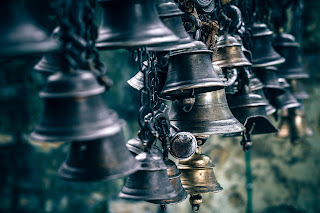Ode to Words (Part 3): Silence
 |
| Photo by Igor Ovsyannykov on Upsplash |
My father taught me the value of silence. It was from him
that I learned it takes more strength to hold your tongue than to loose it.
Daddy was always the quiet one in our house. My mother’s voice was the
dominant, reasoning soundtrack. My brothers’ voices were like murmurs on the
wind .I was the noisy, unruly, talkative one. I was “like a clapper bell from
hell,” my quiet father insisted.
I spent my adolescence resenting my father’s silence, my
twenties and thirties trying to understand it, only to discover in my forties
that daddy wasn’t intentionally silent: he only spoke the words that needed to
be spoken. By the time I entered my 50s, he ended nearly every phone call with “I
love you.” He used his words sparingly, saying only what needed to be said. If
he told me over and over that he loved me it was because he knew I needed to
hear he loved me.
For me, noisy kid that I was, my father’s silence was
particularly jarring when set against my mother’s loquaciousness. Her words
like foot soldiers ran onto the battlefield only to trip on the cliff edge and
tumble into the abyss of his silence—at least that’s how it seemed to me in my
fevered writer’s imagination: an endless, tireless army of words tumbling into
the abyss of silence.
If you’ve read any of my early work, you may have noticed
that one of my recurring themes is “silence.’ This is hardly surprising given
my stories are nearly all grounded in truth, in my lived experiences. A big
part of that lived experience was the quietness of my father.
The excerpt below, from one of my short stories, “2 Rivers,”
is one of my favorites, in part because it was inspired by my parents and how I
saw them at the time:
EXCERPT
My mother was a
professional florist; she orchestrated stunning arrangements in priceless
porcelain vases for people with no sense of beauty or smell. She talked
constantly, compulsively. To my father. To herself. To her minions of flowers.
Her voice filled the empty rooms around her like sunshine after a rain. Her
words tumbled over each other, reaching, grasping air, plunging hysterically
into the void of my father’s silence. Her voice entertained him, seduced him,
very rarely elicited his laughter, sometimes accused him.
My mother’s voice
underscored my childhood memories like a Max Steiner score. It was, of course,
her voice that welcomed me home, wafting down the stairs, “Luke, is that you?”
Her voice greeted me
at the front door, embraced me, backed away holding me at arm’s length, then
pulled me to her bosom and escorted me through the house. It was as if her
loquaciousness could compensate for his resolute silence. Or did it perpetrate
it? For even if he had been inclined to speak, he would not have been able to
get a word in edgewise.
In that house, the
scent of flowers suffocated me. Like my father’s silence. Like my mother’s
voice. Her words, serfs that had once done my bidding—cajoling me out of a
mood, entertaining me, comforting my distress—now rose up against me, their
feudal lord. An army of words, taking up arms, striking down the nation of me.
I had to leave, had to
get back to Seth, to make him understand. My mother’s voice escorted me to my
car, hugged me one last time, wished me safe passage, urged my speedy return.
—From “2 Rivers,” Damaged Angels
Conceptually, I see writing creative fiction as a way to
create art from found objects. Thus, everything around me, finds its way into
my work as a found object; I don’t so much invent as retell, observe, and
detail.
I’ll be at the AWP Writer’s Conference in Tampa, FL next
month where I’ll be joining fellow authors Alan Lessik and Kathy Anderson on a
panel discussing “Writing LGBTQ Fiction Based on Real People.” My father will
almost certainly come up. I hope you can join us for the discussion.
Workshop Description
Novels and short stories are often shaped by real events
happening to real people that they know. Three LGBTQ writers will talk about
the real people within their stories and how the creative process changed both
the characters and ultimately the authors themselves. For LGBTQ writers,
exploring these stories become an exploration of our larger community and the
known and unknown histories of our lives. Each of our writers will discuss
these themes and read from their works.
Workshop # F124
Room 11, Convention Center, First Floor
Friday, March 9, 2018
9:00 am -10:15 am
Room 11, Convention Center, First Floor
Friday, March 9, 2018
9:00 am -10:15 am
______________
Missed Part 2 of this post, Ode to Words (Part 2): Word Soup? You can read it here. Missed Part 1 of this post, Ode to Words (Part 1): One Line Wednesday? You can read it here.



Comments
Post a Comment